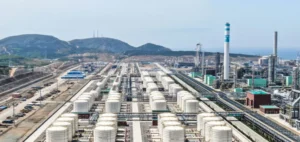Russian exports of oil products, including diesel, fuel oil and naphtha, fell to 2.09 million barrels per day (b/d) in August, according to data from S&P Global Commodities at Sea.
This level represents a 13% drop on July, marking a decline of 300,000 b/d over one month and 700,000 b/d since January.
Refineries in Russia are redirecting production to the domestic market in response to strong summer demand, while shipments to China fell sharply by 55%, reflecting weaker consumption in Asia.
Refining facilities in Russia are adjusting production following a series of Ukrainian drone attacks earlier this year.
While some units, such as Yaroslavl, remain operational after attempted attacks, other sites, such as the Moscow refinery, are experiencing production stoppages following strikes in early September.
These events are disrupting export capacity, while forcing a reassessment of product flows.
Reduced export volumes and repercussions
Diesel, Russia’s leading oil export, saw volumes fall by 16% in August to 670,000 b/d, the lowest level since October 2023.
Naphtha was also down, dropping by 100,000 b/d to 337,000 b/d.
Gasoline exports were particularly hard hit, contracting by 40% to 75,000 b/d.
This decline could be exacerbated by the Russian ban on gasoline exports, effective from the beginning of September until the end of December, aimed at stabilizing domestic prices at the height of the maintenance season and high demand. Exports to China, one of the main destinations, recorded the most significant drop.
Volumes fell to 153,000 b/d, affected by sluggish Asian economic conditions and an oversupply of refined products.
Reduced refining margins on the Asian continent exacerbated this situation, forcing Chinese refiners to reduce their use of crude to historically low levels.
Impact of maintenance and production adjustments
Russian refineries temporarily increase production in August before scheduled maintenance begins in September.
Gazprom’s Astrakhan and Surgut processing facilities are back online after a period of maintenance, temporarily supporting refining rates.
However, unplanned shutdowns at facilities such as Omsk are limiting potential production gains.
Asian refiners, meanwhile, remain cautious about the possibility of a glut of Chinese oil products between now and the end of the year, which could exacerbate a market situation already under pressure.
Crude exports stabilize despite constraints
Russian crude exports stabilized in August, rising slightly to 3.36 million b/d, a 4% increase on July.
Flows to India, Russia’s main customer, rebounded to 1.67 million b/d after a drop in July due to scheduled maintenance at Indian refineries.
Russia is adjusting its exports to comply with OPEC+ production cuts, while offsetting overproduction in the first half of 2024 with a controlled drop in exports.
Margins on Urals crude are evolving against a backdrop of increased surveillance of vessels capable of circumventing the price cap imposed by the G7.
Platts assessments show that the Urals discount to Dated Brent widens slightly in early September, illustrating the adjustment of market players to the new compliance dynamics.





















